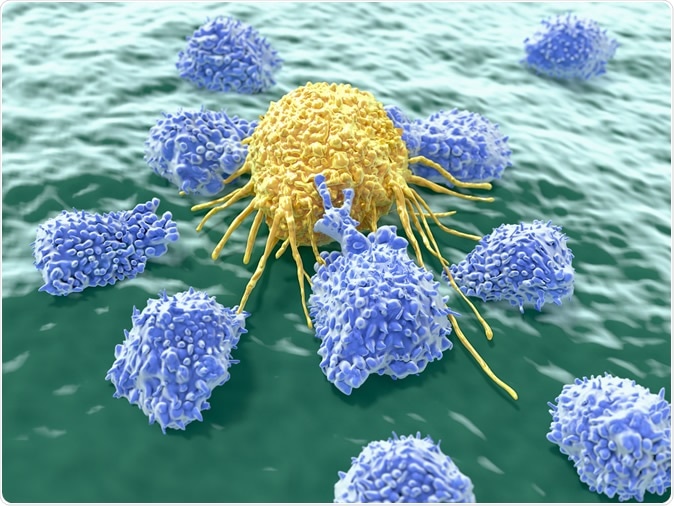Cancer cells form tumors. This statement, simple as it seems, hides a complex failure of normal immune responses that should eliminate tumor cells from the body before they ever form viable cancer masses. In other words, the tumor fools the body into accepting it as a normal part of the body instead of a dangerous invader. Now, scientists have found a weak spot in the cancer cell that could help the immune system to clear it from the body.

Cancer cell attacked by lymphocytes - Illustration Credit: Juan Gaertner / Shutterstock
Immunotherapy, especially using drugs like checkpoint inhibitors that reverse this deceptive mechanism, is designed to overcome this weakness. However, these drugs are limited in their success, have fiercely toxic effects on the body, and are now showing signs of failure due to the emergence of resistance. This emphasizes the need for other immunotherapy options.
The immune system is designed to do two things, broadly: to differentiate normal cells that belong to the body from foreign, and possibly dangerous, particles or cells; and to eliminate the latter. It specifically identifies cells that bear the signature of the host organism, and recruits a host of immune cells of different classes to wipe out foreign cells or particles before they can take a hold.
This mechanism is not foolproof, however, as shown by the millions of cancers that break through this barrier. One prime reason for this is the presence of tumor immunity, which is created by the microenvironment surrounding the immediate vicinity of a cancer. This contains immune cells of various types, some protecting it and helping it grow as if it was part of the body, and others attacking it. The tumor is able to send out false signals of neutrality, deceiving the immune system into accepting it or even promoting its growth and spread. This is one cause for the failure of many immunotherapies based on the specific immune recognition of tumor cells.
Instead, the current study tried to enhance the adaptive (nonspecific) antitumor immune responses.
The researchers looked at possible weaknesses in cell metabolism which could be exploited to make the leukemia cell more vulnerable to attack by a subset of non-specific immune cells called natural killer (NK) cells. They used the powerful gene-editing tool called CRISPR-Cas9 to screen the effect of removing or disrupting various components of the tumor cell genome on the leukemia cell-NK cell interface. They especially wanted to see how the chemical signal called interferon-γ (IFN γ) affected this interaction, because many cancer cells that resist immunotherapy fail to respond to this molecule.
Results
The researchers found that certain genes that made it possible for the tumor cells to interact with the NK cells were of great importance in achieving tumor immunity. They also found that IFN γ originating from the cancer cell was of key significance in tuning NK cell activity.
The experiments brought out the importance of a molecule called DCAF15, which acts as a substrate adaptor for the enzyme called ubiquitin ligase. The ubiquitins are small proteins which ‘tag’ various proteins for different destinations and uses within the cell. One important pathway is the attachment of ubiquitin chains to proteins which are to be broken down within proteasomes in the cell. This involves 3 steps, the last of which is mediated by ubiquitin ligases. This process requires the specific protein to be recognized by the ubiquitin-ligase complex, which is achieved by a substrate adaptor, in this case, DCAF15.
Further investigation of the role of DCAF15 showed that it targets members of a protein class called cohesins. Removing the DCAF15 gene immediately and significantly increased the ease with which the NK cells removed leukemia cells. The effect of disrupting the DCAF15 gene appeared to be inflammation of the leukemia cells. Inflamed tumor cells released a host of signaling molecules that helped NK cells to detect and destroy them.
The researchers then tried to replicate the effect of disrupting the DCAF15 gene by using the anticancer drug called indusulam that inhibits the DCAF15 protein. They found that indusulam did indeed increase the level of a marker molecule called CD80 that enhanced the recruitment of immune cells, similar to the effect caused by DCAF15 gene deletion. In addition, patients with acute myeloid leukemia (AML) had better chances of survival if DCAF15 levels were low.
The study shows that leukemia may be treated more successfully by harnessing the power of DCAF15 inhibitors to improve the efficacy of NK cells in clearing tumor cells from the body. Senior author Jeff Settleman says, “We have identified DCAF15 as an important molecule in controlling the body’s immune response to tumors. Blocking this molecule may be a beneficial strategy in the treatment of blood cancers.”
The study was published in the journal eLife on August 27, 2019.
Source:
Journal reference:
Systematic identification of cancer cell vulnerabilities to natural killer cell-mediated immune surveillance. Matthew Pech, Linda E. Fong, Jacqueline E. Villalta, Leanne J. G. Chan, Samir Kharbanda, Jonathon J. O'Brien, Fiona E. McAllister, Ari J.. Firestone, Calvin H. Jan, & Jeffrey Settleman. eLife. doi: 10.7554/eLife.47362. https://elifesciences.org/articles/47362